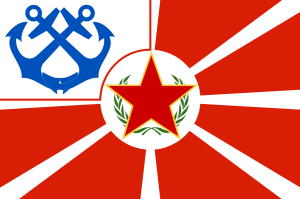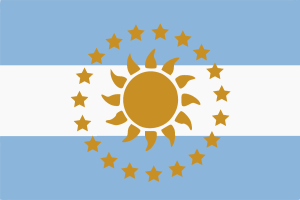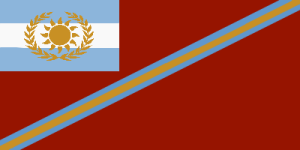Human Wildlands: различия между версиями
>NewOriginalSchwann Нет описания правки |
>NewOriginalSchwann Нет описания правки |
||
| Строка 66: | Строка 66: | ||
The Solarian Sixth Middle Ring Battlegroup is responsible for much of the SPG’s stability and all of its defense. Under the command of Fleet Admiral Myo Yunso, a Konyanger naval officer that has - unlike her homeworld - remained loyal to the Sol Alliance. Admiral Yunso commands the five fleets of the Sixth Middle Ring Battlegroup, one of the largest - if not the largest - remaining cohesive naval units in the southern human wildlands, and stands as Prov. Governor MacPherson’s greatest ally and worst rival in the SPG. While the timely arrival of the Admiral and her fleet helped ensure the region that the SPG now controls (though it claims the entire southern wildlands) remains stable, Yunso and MacPherson have differing opinions on how the provisional government should be run. While MacPherson champions continuing democracy, Yunso wishes for an emergency military government until the situation is stabilized. | The Solarian Sixth Middle Ring Battlegroup is responsible for much of the SPG’s stability and all of its defense. Under the command of Fleet Admiral Myo Yunso, a Konyanger naval officer that has - unlike her homeworld - remained loyal to the Sol Alliance. Admiral Yunso commands the five fleets of the Sixth Middle Ring Battlegroup, one of the largest - if not the largest - remaining cohesive naval units in the southern human wildlands, and stands as Prov. Governor MacPherson’s greatest ally and worst rival in the SPG. While the timely arrival of the Admiral and her fleet helped ensure the region that the SPG now controls (though it claims the entire southern wildlands) remains stable, Yunso and MacPherson have differing opinions on how the provisional government should be run. While MacPherson champions continuing democracy, Yunso wishes for an emergency military government until the situation is stabilized. | ||
As the two most powerful figures in the provisional government clash over direction and influence, it remains to be seen whether the Solarian Provisional Government has any hope of stabilization and reunification. With its rivals growing more powerful by the day, and the divide between MacPherson and Yunso growing wider and wider, the situation of the legitimate successor to Solarian control in the southern wildlands remains quite precarious indeed. However, with the recent victory over Beauchamp and more aid flowing in from the Alliance, it seems MacPherson may be pulling ahead. Yunso, however, remains dominant in more chaotic | As the two most powerful figures in the provisional government clash over direction and influence, it remains to be seen whether the Solarian Provisional Government has any hope of stabilization and reunification. With its rivals growing more powerful by the day, and the divide between MacPherson and Yunso growing wider and wider, the situation of the legitimate successor to Solarian control in the southern wildlands remains quite precarious indeed. However, with the recent victory over Beauchamp and more aid flowing in from the Alliance, it seems MacPherson may be pulling ahead. Yunso, however, remains dominant in more chaotic areas closer to the border with the SFA — particularly in those limited regions the SPG managed to gain control over following Beauchamp’s death. | ||
The Provisional Government has a uniquely stable capital system, '''Sankt Frederick''', due to its location on the border with the Alliance itself. With the Alliance itself merely one warp gate away much of Sankt Frederick’s government has remained operational and functional, which has significantly strengthened MacPherson’s position in the Wildlands. The close position has additionally assisted in ensuring Yunso’s battlegroup has remained cohesive, and many supplies which eventually make their way to the Military District pass through Sankt Frederick. The planet has become a hub for refugees fleeing from the anarchy of the Southern Fleet Administration’s territories and MacPherson’s government has opened their arms to them, as long as they are human. Many of these refugees eventually find employment in the large orbital facilities Sankt Frederick is known for, or find their way into the Alliance proper. | The Provisional Government has a uniquely stable capital system, '''Sankt Frederick''', due to its location on the border with the Alliance itself. With the Alliance itself merely one warp gate away much of Sankt Frederick’s government has remained operational and functional, which has significantly strengthened MacPherson’s position in the Wildlands. The close position has additionally assisted in ensuring Yunso’s battlegroup has remained cohesive, and many supplies which eventually make their way to the Military District pass through Sankt Frederick. The planet has become a hub for refugees fleeing from the anarchy of the Southern Fleet Administration’s territories and MacPherson’s government has opened their arms to them, as long as they are human. Many of these refugees eventually find employment in the large orbital facilities Sankt Frederick is known for, or find their way into the Alliance proper. | ||
Версия от 08:11, 20 июля 2022
IMPORTANT NOTE: Many of these factions will be quite difficult to play on the station due to the chaotic nature of the wildlands! FOLLOWERS OF THE SOLARIAN RESTORATION FRONT, IN PARTICULAR, WOULD NOT BE TOLERATED WITHIN THE REPUBLIC OF BIESEL DUE TO ITS EXTREMELY XENOPHOBIC NATURE!
In the chaotic aftermath of the Solarian Alliance’s retreat from its Middle and Outer Rings much of the now-leaderless rings were swept up by the Coalition of Colonies and the grotesquely enlarged Republic of Biesel, providing some measure of stability to a region that the previous hegemon of the Orion Spur had simply left to burn due to crippling internal issues that left it unable to hold onto its more distant, and less loyal, territories. But the Coalition and Republic were not able to reach every system abandoned by the Sol Alliance in its retreat giving rise to the anarchic sectors referred to as the human wildlands. The human wildlands are bisected by the Republic of Biesel and are divided into the northern and southern wildlands, with the northern wildlands being significantly larger than the southern wildlands.
The human wildlands are home to a variety of successor states often colloquially referred to as post-Solarian warlords in the galactic press. These successor states can control everywhere from one planet to multiple systems, though many have debatable levels of control over their claimed areas and are not recognized as legitimate governments by the greater Orion Spur. While the vast majority of these successor states control very little territory several have come to relative prominence in the months following the Solarian retreat, and have become relatively well-known in the wider Orion Spur thanks to media coverage of them. The following seven successor states are the most widely-known and prominent factions within the human wildlands, but are by no means the only ones in the wildlands.
The Solarian Restoration Front

Extremely nationalistic even by the standards of the authoritarian Solarian Alliance, the Solarian Restoration Front is often rightfully viewed as the most militaristic of the Solarian successor states that now jockey for control of the “wildlands” that now make up the former Middle and Outer Rings of the Solarian Alliance. The Front believes that the Alliance’s third tajara ban was both not enough and too soft on aliens in the Alliance, and they view this softness as the main cause for its collapse. Thus the Front strives to create a highly-militarized, extremely authoritarian, and human only state in the wildlands as a basis for purifying the Sol Alliance itself of degenerating alien influence, no matter the cost.
The ultranationalist xenophobia of the Front can be traced to its origins in a very specific Solarian fleet: the 35th. Even before its invasion of Tau Ceti the 35th Fleet was considered to be one of the most rabidly nationalistic fleets of the Sol Alliance, and its bloody invasion of Tau Ceti and chaotic retreat into the wildlands following Admiral Özdemir’s death further radicalized the Fleet. Rear Admiral Anton Verglas, the new commander of the 35th Fleet’s remnants, had a great amount of time to ponder what, exactly, had gone wrong during the chaotic final months of the Sol Alliance that he had grown up knowing. His ultimate conclusion was a typical one for Solarians, particularly after the collapse: the government had been too soft on alien fifth columnists, particularly tajara, including their human patsies, despite signs they were stirring unrest and the only solution was deportation. But Verglas went further than the typical Solarian: instead of pushing for the removal of solely tajara, he seeks to create a section of the wildlands free of aliens and entirely populated by humans in preparation for what he describes as the “purification” of the decrepit Solarian Alliance. The whisperings of his badly-injured fleet intelligence officer, Florentina von Keyserling, likely had an influence upon this very radical stance.
The areas under the control of the Front are ruled with an iron fist. All resources that can be directed towards waging a war of reunification are utilized, and all non-human residents - and their human associates - are swiftly dealt with through whatever means are deemed necessary. The scarred von Keyserling has been a major driving force behind the Front’s so-called “hunts” for nonhumans, seeing them as parasites living off of the success of humanity. With the 35th Fleet badly scarred by the disastrous invasion of Tau Ceti, much of its effective strength is made up of defectors from other fleets that have chosen to align themselves with the Front’s stance on aliens within the territory of the Alliance - with the 33rd Fleet, previously under the command of Admiral Michael Frost, making up much of the Front’s effective strength thanks to defections. The Front also has access to a great amount of Solarian Navy equipment, thanks to many officers simply looking the other way when Front vessels requisition supplies. Thanks to its external support by the Sol Alliance’s Navy, the Front is in a better position than most rivals to establish itself in the wildlands - and perhaps the Alliance itself, someday.
In no place is the Front’s control more obvious than its provisional capital of Lycoris, which has been under Front control since the Solarian Collapse. Lycoris is a heavily industrialized world with an agricultural moon where much of its richer population resides known as Lycoris Minor. The planet itself is known for its large orbital facilities which, until the Collapse, primarily constructed ships for Hephaestus Industries. Now these facilities serve the ships of the Front and, rarely, retrofit Front vessels with modern Suzuki-Zhang engines which have somehow ended up in the Wildlands. Life on Lycoris has become one of constant fear under Front control: aliens, foreign humans, and suspected traitors are rounded up by local authorities who have long collaborated with the Front, and rapidly disappear. Citizens of the planet are expected to be slavishly loyal to the Front despite its increasingly rampant looting of the planet’s key industries and must attend rallies in support of the Front or suffer the consequences, which are inevitably disappearing or being conscripted into penal units. Many attempt to escape but few succeed thanks to a pervasive culture of collaboration, and those that do flee the Wildlands are often viewed as complicit in the atrocities of the SRF.
The League of Independent Corporate-Free Systems

Many radical political changes followed the retreat of the Solarian Alliance from its Middle and Outer Rings. In most areas this political change was accompanied by a reckoning over what, exactly, had caused the once-great Solarian Alliance to slowly atrophy, decay, and then abandon the majority of its outlying territories. In some areas the answer was that the Alliance had been too soft on the Republic of Biesel, or that it had been tainted by alien influence, or that it had been too ambitious and large. But in the human wildlands close to the former Alliance Neutral Zone, another explanation emerged: that the Alliance had collapsed due to the meddling of corporations and if only the Alliance had stood against the forces of interstellar capitalism, it would have never collapsed. Thus from the ashes of the Alliance’s colonies emerged something truly unforeseen in the Orion Spur: a left-leaning, anti-corporate “successor state” to the Alliance in the region.
The resulting League of Independent Corporate-Free Systems is something of an oddity. As the union of many disparate (and, perhaps, desperate) systems in the wildlands unified only by their shared hatred of corporations, the League is hardly a truly unified force. Instead it is governed in a manner similar to the Coalition of Colonies, though with a more militant purpose in mind: individual planets and former Solarian fleets loyal to the League make up the anti-corporate council, the nearest thing that the League has to a governing body. This council is further divided into a civilian and military wing, with the military wing - made up of anti-corporate Solarian naval and army officers - generally taking priority over the civilian wing, due to the threats posed to the young League by corporate mercenaries and other successor states alike.
The anti-corporate stance of the League has cut it off from much of the outside support other factions in the wildlands enjoy, but it is not without its supporters and sponsors. The United Syndicates of Himeo and the United Planetary Defense Council of Gadpathur have both stated their intent to support the League, and have provided aid. The Himeans seek to establish a powerful anti-corporate state aligned with their interests, with the eventual intent of allowing them into the Coalition to swing the balance of power out of Xanu Prime’s favor, while Gadpathur simply seeks to create a buffer zone between Sol and the Coalition. Regardless of the intents of their sponsors, the League is slowly gathering its power in order to bring about its vision for the northern wildlands. As the main regional rival of the Solarian Restoration Front, a showdown over control of the wildlands seems all but inevitable.
Unfortunately the League’s patchwork politics are on full display in its capital, New Atlantica. Not technically a planet at all, New Atlantic is instead a moderately large naval base complete with multitude of sensor relays, all of which were pointed towards the Coalition prior to the Collapse, New Atlantica has now become known as a kind of miniature Konyang where Sol and the Coalition have culturally collided, though in a far messier manner than its synthetic-producing counterpart. Fights between League members — and, occasionally, their Coalition advisors — over the future of the League are common, and what civilian residents remain on the station have tried to keep their heads down. Many of the original inhabitants, most of whom were offworlders, have since fled for less chaotic environments. Only limited repairs can be performed in New Atlantica’s facilities, and the League’s attrition rate has steadily climbed as a result.
The Middle Ring Shield Pact

Unfortunately located between the Solarian Restoration Front and the League of Independent Corporate-Free Systems is a loosely-aligned cluster of fairly wealthy Middle Ring planets that have banded together to form what they refer to as the Middle Ring Shield Pact, a defensive alliance designed to protect them from their neighbors. The Pact was formed shortly after the collapse of Solarian authority within the Middle Ring, and it was one of the first powers to emerge in the warlordism following said retreat of Solarian authority. This, combined with a robust (if arguably megacorporate-owned) local bureaucracy, has led to the Pact becoming an island of relative stability in the anarchy of the northern wildlands. But the Pact has hardly become a successful military power in the region, with most defecting Solarian fleets instead casting their luck with the Restoration Front or the League. Aside from their mediocre military situation the decentralized leadership of the pact has led to decision-making becoming increasingly awkward and difficult as the situation around them has worsened.
The decentralized nature of the Pact, combined with the lack of a full battlegroup under its command, has made its situation quite desperate indeed. On one side, the League looks at it as a catspaw of corporate interests that has persisted despite the collapse of Solarian authority in the region due to its megacorporate sponsors and views defeating it as the first step towards the creation of a space free of the meddling interests of the ruinous megacorporations. On the other side the Restoration Front views the Pact as a rich and weak power that will serve its goal of creating a region free of the degenerating influence of aliens that destroyed the Alliance’s glory. With many megacorporations more concerned with exploiting the (more stable) recently-acquired territories of the Republic of Biesel, the situation of the Pact looks more and more dire by the day. Even with the mercenaries of the Free Solarian Fleets on their payroll (for as long as the Credits continue to flow into their vessels) it is doubtful that both the League and the Front can be held off by the Pact.
But this doubt has not stopped the Pact from fortifying its capital, San Colette, for the inevitable war which draws inexorably closer as the Front and League become more and more aggressive. As one of the rare worlds aside from Tau Ceti and Medina graced with naturally-occurring phoron deposits, San Colette has no shortage of funds and sponsors. Its government has used these funds to create a system flush with defenses and regularly patrolled by mercenaries and corporate assets. Life in San Colette’s surface has proceeded much in the way it did before the Collapse — though with larger populations of refugees — thanks to its wealth, and the ruling Council of San Colette is responsible for much of the ties that bind the Pact together. But this wealth is acquired from a source outside the planet itself: D’Anzin, a small and ice-covered rock that happens to hold the system’s only existing phoron deposit. D’Anzin is mostly populated by offworlders, but has seen a recent population boom as desperate refugees have begun working in its mines to meet ends meet — and to make the Pact able to fund its defense.
War will come to the Pact. It is not a question of if anymore, but a question of when - and the victor will have the northern wildlands at their fingertips.
The Free Solarian Fleets

Unique amongst the major successor states in the wildlands are the former Solarian battle fleets of the Free Solarian Fleets. The reason for this uniqueness relate to the Fleets’ origins and goals: while they, like many successor states, were formerly a Solarian fleet group (in this case, the 8th Middle Ring Defense Group), the Free Solarian Fleets do not rule over any planets or claim any greater goals beyond making money hand over fist as mercenaries in the wildlands. They have an utter disinterest in conquering and holding territory of their own, instead opting to serve as a mercenary fleet for the highest bidder in the wildlands. While some may call them cowards and opportunists, it cannot be denied that the Free Solarian Fleets’ focus on profits rather than planets has made them into one of the most powerful military forces in the wildlands, and a reliable military force (as long as the Credits keep coming).
Much of this attitude can be traced to the leader of the Free Solarian Fleets: Pieter van der Rensburg, a former Solarian Fleet Admiral in command of the Fifth Middle Ring Battlegroup consisting of the 138th, 139th, 140th, 141st, and 142nd fleets. As the phoron crisis worsened and the Sol Alliance became less and less stable van der Rensburg’s four fleets were initially placed upon limited patrols, then withdrawn from patrols, then dry docked until further notice, and then ordered to retreat from their berths in the Middle Ring to the Sol System itself following the disastrous invasion of the Republic of Biesel by the 35th Fleet. This proved to be the last straw for Fleet Admiral van der Rensburg and the ships under his command, leading to the mutiny and defection of all five fleets. As the Middle and Outer Rings descended into anarchy around them, the former battlegroup remained mostly cohesive thanks to the charismatic leadership of van der Rensburg, who quickly realized that the fleets would need a new source of supplies following the retreat of the Sol Alliance.
With his fleets mostly intact - and definitely more intact than most other forces in the wildlands - van der Rensburg could have easily set up a military fiefdom in the wildlands and why he did not may remain a mystery forever. Perhaps the sixty-five year old flag officer was tired of constantly grinding his forces down for what felt like nothing, or perhaps he simply wanted to make as much money as possible from a horrific situation. Regardless of his motivation the outcome was that the battlegroup was reformed into the Free Solarian Fleets, and would now fight for the highest bidder and only the highest bidder. With their berth safely secure in the Middle Ring Shield Pact thanks to generous payments, the Fleets - and van der Rensburg - now treat the wildlands as their personal money-making safari, paying little heed to the consequences of their actions - and the ruins they often leave during their contracts.
The Free Solarian Fleets control no real territory and call no system their home. However, many FSF vessels can be found in the Middle Ring Shield Pact’s capital of San Colette, which has become the arguable home of its fleets. FSF ships, which can travel as far afield as the Corporate Reconstruction Zone and the Sparring Sea, often return to San Colette to repair, rearm, and resupply after their latest job. Authorities in San Colette have become known to look the other way regarding the more eccentric crewmembers of the Fleets — including free positronic sans aliens — as a kind of reward for the continued contract they have with the Fleets.
The Southern Solarian Military District

While many of the fleets assigned to the area that would become the southern badlands, such as the Tenth Middle Ring Battlefleet, were considered second or even third-rate organizations, one formation stood above the rest in terms of quality. The First Middle Ring Battlefleet - made up of the 103rd, 104th, 105th, 106th, and 107th fleets - under the command of Fleet Admiral Klaudia Szalai was considered to be the best fleet in the sector before it was lost during the chaos of the Solarian collapse due to a lack of phoron for its dated engines. Most observers wrote the First off as having collapsed as an effective force during the collapse, due to a lack of communication from the battlegroup. It came as quite a shock for many external observers when, nearly a full month after the collapse, Admiral Szalai finally reestablished communications with the outside world and declared that the First had formed the Southern Solarian Military District, and was intent on stabilizing the southern wildlands pending their reintegration with the Alliance.
While the District’s main counterpart, the Solarian Provisional Government, promotes itself as a democratic state Admiral Szalai and the District have no such pretentions: the District is a military state through and through and, unlike the SPG, has lukewarm relations with corporations at best. Admiral Szalai is a dogged supporter of the Alliance’s recent anti-corporate efforts, believing that the meddling of NanoTrasen and its sycophants in other corporations was the largest single factor leading to the collapse of the Alliance as she knew it. Thus many formerly corporate assets in the District have found themselves hastily taken over by the First regardless of protests. This has led to it having little backing from the remnants of the civilian government of the Solarian Alliance, while making the District steadfast allies in the Solarian Navy forces stationed on the border between the wildlands and the Alliance proper. This, combined with the First’s already stellar reputation for anti-piracy operations, gives the District a significant chance at being the successor state that manages to stabilize the southern wildlands.
However some of Admiral Szalai’s comments have been seen as alarming by outside authorities, particularly those in the Republic of Biesel. The Admiral views the stabilization of the southern wildlands as only the first step towards her goal of reclaiming the Alliance’s former position as the human hegemon of the Orion Spur, and the First has been known to engage ships flying the Republic’s flag on sight in addition to launching raids from their territory into the Republic’s poorly-controlled and recently-acquired territories. Whether this talk is simply militaristic bluster or a legitimate desire to begin a second Interstellar War remains to be seen. For now, effective control of the wildlands remains enough of a challenge for any force - even one as effective as the District.
The seat of power of the Military District is Visegrad, a former Solarian world seized by Szalai and the First during the initial chaos of the Solarian Collapse. Despite some protests at the Military District’s shutdown of Zeng Hu's operations on Visegrad — which employed many residents of the planet — the stability brought by the ruling military government is welcomed by many on the planet due to the chaos of the Southern Wildlands. Due to Szalai’s strong links to the Solarian admiralty the SSMD — and Visegradi by extent— receive a great amount of aid from the Alliance, though much of this aid is more concerned with stabilizing the Southern Wildlands than it is with ensuring the civilian population lives comfortably. The leader of the Southern Fleet Administration, F.R. Beauchamp, was executed on Visegrad.
The Solarian Provisional Government

In the southern human wildlands lies the Solarian Provisional Government, the remnants of the Solarian Alliance’s massive bureaucratic apparatus that once lorded over the vast majority of the Middle Ring. While it is a mere rump state compared to the titanic bureaucracy that once managed planets from Mictlan to New Hai Phong and most of its skilled bureaucrats have fled to the what remains of the Alliance, the SPG has managed to hold onto a small amount of ground near the Solarian border with the wildlands thanks to the presence of the Sixth Middle Ring Battlegroup and unofficial support from the Alliance itself. The SPG aligns itself closely with the Alliance and, while there has not yet been an official statement of support, the Alliance has responded by offering “humanitarian” aid to the region under the SPG’s control. In response the provisional government has stated its clear intentions to rejoin the Alliance when the region around it is stabilized.
The provisional government is an unusual form of dual authority in the human wildlands. On paper the Solarian Provisional Government is a functional, if unrecognized, democratic republic along the lines of the Solarian Alliance itself that intends to hold regular elections and transfer power as any successful republic does. The current Provisional Governor is Anderson MacPherson, previously the region’s elected Governor before its collapse into warlordism and anarchy. The Provisional Governor’s cabinet and staff are primarily formed from bureaucrats left over from the old administration, leaving the SPG with a more stable system of governance than most other regions in the human wildlands. Prov. Governor MacPherson has managed to keep the SPG’s territories together through his local popularity and charm, though he now faces an unexpected threat: the Navy.
The Solarian Sixth Middle Ring Battlegroup is responsible for much of the SPG’s stability and all of its defense. Under the command of Fleet Admiral Myo Yunso, a Konyanger naval officer that has - unlike her homeworld - remained loyal to the Sol Alliance. Admiral Yunso commands the five fleets of the Sixth Middle Ring Battlegroup, one of the largest - if not the largest - remaining cohesive naval units in the southern human wildlands, and stands as Prov. Governor MacPherson’s greatest ally and worst rival in the SPG. While the timely arrival of the Admiral and her fleet helped ensure the region that the SPG now controls (though it claims the entire southern wildlands) remains stable, Yunso and MacPherson have differing opinions on how the provisional government should be run. While MacPherson champions continuing democracy, Yunso wishes for an emergency military government until the situation is stabilized.
As the two most powerful figures in the provisional government clash over direction and influence, it remains to be seen whether the Solarian Provisional Government has any hope of stabilization and reunification. With its rivals growing more powerful by the day, and the divide between MacPherson and Yunso growing wider and wider, the situation of the legitimate successor to Solarian control in the southern wildlands remains quite precarious indeed. However, with the recent victory over Beauchamp and more aid flowing in from the Alliance, it seems MacPherson may be pulling ahead. Yunso, however, remains dominant in more chaotic areas closer to the border with the SFA — particularly in those limited regions the SPG managed to gain control over following Beauchamp’s death.
The Provisional Government has a uniquely stable capital system, Sankt Frederick, due to its location on the border with the Alliance itself. With the Alliance itself merely one warp gate away much of Sankt Frederick’s government has remained operational and functional, which has significantly strengthened MacPherson’s position in the Wildlands. The close position has additionally assisted in ensuring Yunso’s battlegroup has remained cohesive, and many supplies which eventually make their way to the Military District pass through Sankt Frederick. The planet has become a hub for refugees fleeing from the anarchy of the Southern Fleet Administration’s territories and MacPherson’s government has opened their arms to them, as long as they are human. Many of these refugees eventually find employment in the large orbital facilities Sankt Frederick is known for, or find their way into the Alliance proper.
The Southern Fleet Administration

Even before the total collapse of Solarian authority in much of the Middle and Outer Rings, the Tenth Middle Ring Battlegroup under the command of Fleet Admiral F.R. Beauchamp was considered to be the absolute bottom of the Solarian Navy’s figurative barrel. With much of its enlisted being made up of prisoners conscripted or enlisted into the Navy for a reduced prison sentence and the vast majority of its officers being washouts deliberately reassigned to the Tenth due to their failings, discipline was lax even before the phoron crisis. Many Solarian naval officers doubted the Tenth could even muster itself to fight off even a minor incursion by pirates. But the Solarian collapse has been a time of many surprises, including the Tenth’s shocking rallying under Admiral Beauchamp to form the so-called Southern Fleet Administration shortly after the general Solarian withdraw from the region now known as the southern wildlands.
Despite its bureaucratic name and Admiral Beauchamp’s claims of being the only legitimate Solarian authority to be found in the southern wildlands the area once controlled by the Southern Fleet Administration was and remains a poorly-administered and uncoordinated zone, with the SFA having essentially existed as a despotic kleptocracy under the control of Beauchamp and a small clique of loyal officers. Contrary to the nearby Solarian Provisional Government the SFA was only interested in enriching itself, and Admiral Beauchamp was solely interested in living as hard and fast as possible until his clique - and regime - collapsed. The territories once under the “protection” of the Tenth remain in state of chaos with the fleet’s remnants having collapsed into roving bands of pirates and marauders, with most passing ships forced to pay for “protection” provided by the fleet. The begrudging alliance between the Tenth and the Republic of Biesel has since collapsed and the Corporate Reconstruction Zone had found itself infested by the well-equipped ex-Navy pirates who once swore allegiance to Beauchamp, with some planets in the southern section of the Zone being arguably completely controlled by the Republic’s former allies.
The skrell are seen as the primary enemy of the remains of the kingdom of bandits that was the SFA. Skrell unlucky enough to find themselves in the hands of the pirates that once made up the Tenth do not survive for long, and are often subjected to profane cruelties at the hands of the rogue fleet the Jargon Federation once declared destroyed. Ships loyal to the Southern Solarian Military District fare no better, with both the SSMD and ex-SFA bandits refusing to offer the other any mercy. While the Federation and Alliance may have hoped cutting the head from the snake would make the southern wildlands more peaceful, it seems the territory once controlled by Beauchamp has only sunken further into a quagmire following their efforts.
As the SFA has devolved to being little more than pirates following the death of Beauchamp there is no “capital,” planet of the contemporary SFA. Some of the more prominent leaders of the SFA have retained some amount of authority following Beauchamp’s death and now serve as warlords in their own right. These warlords are all that pass for authority in the area formerly controlled by the SFA.







